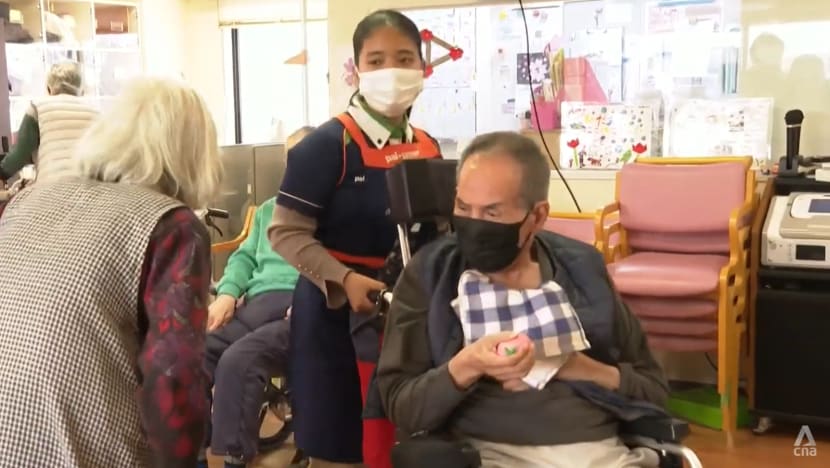Myanmar workers among fastest-growing group of foreign workers in Japan as society ages
As Japan formulates new policies to bring in more foreign workers, it also suffers from a perception problem, having been accused of being “xenophobic” and “racist” by some.

Ms Moe Moe Khine, 21, was recruited from Myanmar in 2023 to work at a daycare facility in Japan.

This audio is generated by an AI tool.
TOKYO: When Ms Myo Myo Thein jumped at the chance to work in Japan in 2022, the Myanmar national drew a salary that was comparable to what her local colleagues earned - thanks to her Japanese language prowess.
The 25-year-old university graduate worked in cleaning and maintenance, joining a wave of Myanmar citizens who left their conflict-ridden country for Japan.
She qualified as a skilled worker due to her ability to speak Japanese, which she picked up with the intention of working there. This also means she can stay in Japan for five years, providing greater stability for her and her employer.
“My friend who was here told me Japan places importance on discipline, so I thought of working in Japan,” she told CNA. “If I have the chance, I want to work for a famous hotel.”
Notorious for being closed to immigrants, the East Asian nation is being forced to open its doors to foreign workers due to a rapidly ageing society.
The number of such workers reached a record high last year, exceeding 2 million for the first time.
XENOPHOBIC AND RACIST?
As new policies are being formulated to bring in more foreign workers like Ms Myo Myo Thein, Japan suffers from a perception problem, having been accused of being “xenophobic” and “racist” by some.
In January, three foreign-born residents filed a lawsuit against the Japanese national and local governments over alleged illegal questioning by police based on racial profiling.
More recently on May 1, United States President Joe Biden said that "xenophobia" from China, Japan and India is hobbling their economic growth, and that they do not want immigrants.
However, experts said that the Japanese people’s acceptance of foreigners is improving.
“Of course, some kind of apprehension remains,” Mr Akio Kawato, the former Japan Ambassador to Uzbekistan and Tajikistan, told CNA’s East Asia Tonight.
The ex-diplomat, who is also a columnist at Newsweek Japan, added: “As far as Mr Biden’s statement, I’m not so much worried about it.
“I think maybe Japanese media has made … too much fuss about it. I think Mr Biden’s statement is mostly oriented to the domestic audience.”
As for whether Japan will eventually fully accept foreigners, Mr Kawato said he did not think it was a matter of ideas or ideology, but rather the needs of certain sectors that require foreign workers.
“Also, our data is mostly limited to so-called physical work. As far as intellectual work is concerned, several CEOs of major Japanese companies are now foreigners,” he added.
FOREIGN TRAINEE SCHEME TO BE REPLACED
As Japan seeks to attract more talent, it is set to replace its foreign trainee scheme with an alternative that allows better rights protection and job flexibility.
Technical trainees make up the second-largest group of foreigners in Japan, after professionals. Criticism has emerged over the years that foreign trainees are used as cheap labour.
Such reform of the scheme could benefit the tens of thousands of Myanmar workers in Japan.
The Southeast Asian country has been gripped by violence since a military coup in 2021, driving many of its citizens to seek refuge overseas.
Due to the instability, the Japanese government decided to allow Myanmar citizens to extend their stay for a year after their visa expired. Permits can be further extended if instability continues there.
OVER 70,000 MYANMAR CITIZENS WORKING IN JAPAN
Along with those from Indonesia and Nepal, Myanmar nationals now make up one of the fastest-growing groups of foreign workers in Japan.
More than 70,000 were working in Japan as of 2023 – an almost 50 per cent jump from the previous year, according to official figures.
This has made competition tough for employment in the land of the rising sun.
During group interviews in Myanmar’s largest city of Yangon in February, about 100 applicants were vying for 20 job vacancies in Japan. These jobs were in sectors like distribution and food processing.
Ms Ryoko Mataga, who represents a union of businesses, said he began recruiting trainees in Myanmar from 2016 because a growing number of them speak Japanese.
“There is strong interest in the Japanese language. Those who apply say they have been studying Japanese for a year or two. Most studied while working,” said the director of NKU Network Union.
“There are those who quit their jobs to attend a Japanese language school (in Myanmar) and say they want to go to Japan,” she added.
Ms Mataga herself has hired Ms Phyo Htet Htet San, also a Myanmar national, to provide translation and visa support for her countrymen.

FOREIGN WORKERS NEEDED IN ELDERCARE
Japan’s eldercare industry is one of the most eager to hire workers from Myanmar. Due to the country’s ageing workforce, the sector could find itself short of 320,000 employees by next year, according to projections by the Ministry of Health, Labour and Welfare.
However, it imposes stricter regulations on foreign workers. All of them, even trainees, must speak some Japanese because of the need to communicate with the elderly.
Mr Kenji Sato set up an agency to recruit, train and match foreign workers to eldercare facilities in 2016. He has brought in 120 workers from Myanmar since 2019.
The director of Kokusaikaigojigyoudan said that his company visited various countries, including Indonesia and Vietnam.
“Myanmar has the most similarities to Japan in terms of culture. The people are calm. Many are devoted Buddhists. Their character is the most suitable, so we all decided on Myanmar,” he explained.
Among the workers he has recruited is Ms Moe Moe Khine, who was scouted for a daycare facility last year.
The 21-year-old told CNA that she chose Japan because of its vibrant economy and changing seasons with beautiful scenery.
After three years in Japan, Ms Moe Moe Khine can also qualify as a skilled worker and stay for another five years – or even as long as she likes if she passes a national exam for caregivers.
“I want to work (here) for 10 years. After that, I will return to Myanmar … I will build a school and teach nursing care,” she added.



















